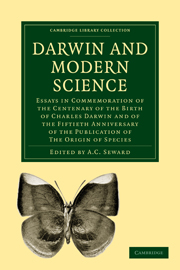 Darwin and Modern Science
Darwin and Modern Science Book contents
- Frontmatter
- PREFACE
- Contents
- LIST OF ILLUSTRATIONS
- DATES OF THE PUBLICATION OF CHARLES DARWIN'S BOOKS AND OF THE PRINCIPAL EVENTS IN HIS LIFE
- I Introductory Letter to the Editor from SIR
- II Darwin's Predecessors
- III The Selection Theory
- IV Variation
- V Heredity and Variation in Modern Lights
- VI The Minute Structure of Cells in Relation to Heredity
- VII “The Descent of Man”
- VIII Charles Darwin as an Anthropologist
- IX Some Primitive Theories of the Origin of Man
- X The Influence of Darwin on the Study of Animal Embryology
- XI The Palaeontological Record. I. Animals
- XII The Palaeontological Record. II. Plants
- XIII The Influence of Environment on the Forms of Plants
- XIV Experimental Study of the Influence of Environment on Animals
- XV The Value of Colour in the Struggle for Life
- XVI Geographical Distribution of Plants
- XVII Geographical Distribution of Animals
- XVIII Darwin and Geology
- XIX Darwin's work on the Movements of Plants
- XX The Biology of Flowers
- XXI Mental Factors in Evolution
- XXII The Influence of the Conception of Evolution on Modern Philosophy
- XXIII Darwinism and Sociology
- XXIV The Influence of Darwin upon Religious Thought
- XXV The Influence of Darwinism on the Study of Religions
- XXVI Evolution and the Science of Language
- XXVII Darwinism and History
- XXVIII The Genesis of Double Stars
- XXIX The Evolution of Matter
- INDEX
II - Darwin's Predecessors
Published online by Cambridge University Press: 07 September 2010
- Frontmatter
- PREFACE
- Contents
- LIST OF ILLUSTRATIONS
- DATES OF THE PUBLICATION OF CHARLES DARWIN'S BOOKS AND OF THE PRINCIPAL EVENTS IN HIS LIFE
- I Introductory Letter to the Editor from SIR
- II Darwin's Predecessors
- III The Selection Theory
- IV Variation
- V Heredity and Variation in Modern Lights
- VI The Minute Structure of Cells in Relation to Heredity
- VII “The Descent of Man”
- VIII Charles Darwin as an Anthropologist
- IX Some Primitive Theories of the Origin of Man
- X The Influence of Darwin on the Study of Animal Embryology
- XI The Palaeontological Record. I. Animals
- XII The Palaeontological Record. II. Plants
- XIII The Influence of Environment on the Forms of Plants
- XIV Experimental Study of the Influence of Environment on Animals
- XV The Value of Colour in the Struggle for Life
- XVI Geographical Distribution of Plants
- XVII Geographical Distribution of Animals
- XVIII Darwin and Geology
- XIX Darwin's work on the Movements of Plants
- XX The Biology of Flowers
- XXI Mental Factors in Evolution
- XXII The Influence of the Conception of Evolution on Modern Philosophy
- XXIII Darwinism and Sociology
- XXIV The Influence of Darwin upon Religious Thought
- XXV The Influence of Darwinism on the Study of Religions
- XXVI Evolution and the Science of Language
- XXVII Darwinism and History
- XXVIII The Genesis of Double Stars
- XXIX The Evolution of Matter
- INDEX
Summary
In seeking to discover Darwin's relation to his predecessors it is useful to distinguish the various services which he rendered to the theory of organic evolution.
(I) As everyone knows, the general idea of the Doctrine of Descent is that the plants and animals of the present-day are the lineal descendants of ancestors on the whole somewhat simpler, that these again are descended from yet simpler forms, and so on backwards towards the literal “Protozoa” and “Protophyta” about which we unfortunately know nothing. Now no one supposes that Darwin originated this idea, which in rudiment at least is as old as Aristotle. What Darwin did was to make it current intellectual coin. He gave it a form that commended itself to the scientific and public intelligence of the day, and he won wide-spread conviction by showing with consummate skill that it was an effective formula to work with, a key which no lock refused. In a scholarly, critical, and pre-eminently fair-minded way, admitting difficulties and removing them, foreseeing objections and forestalling them, he showed that the doctrine of descent supplied a modal interpretation of how our present-day fauna and flora have come to be.
(II) In the second place, Darwin applied the evolution-idea to particular problems, such as the descent of man, and showed what a powerful organon it is, introducing order into masses of uncorrelated facts, interpreting enigmas both of structure and function, both bodily and mental, and, best of all, stimulating and guiding further investigation.
Information
- Type
- Chapter
- Information
- Darwin and Modern ScienceEssays in Commemoration of the Centenary of the Birth of Charles Darwin and of the Fiftieth Anniversary of the Publication of The Origin of Species, pp. 3 - 17Publisher: Cambridge University PressPrint publication year: 2009First published in: 1909
Accessibility standard: Unknown
Why this information is here
This section outlines the accessibility features of this content - including support for screen readers, full keyboard navigation and high-contrast display options. This may not be relevant for you.Accessibility Information
- 1
- Cited by